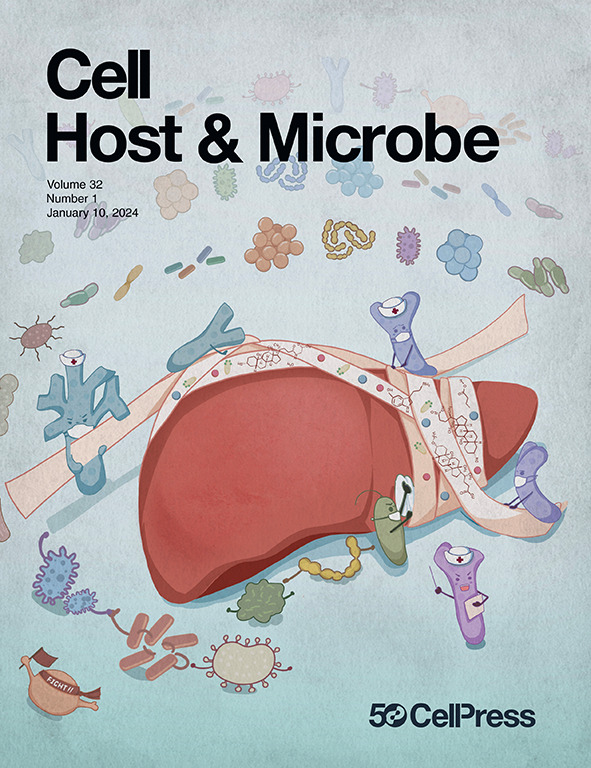Drought-induced plant microbiome and metabolic enrichments improve drought resistance
IF 18.7
1区 医学
Q1 MICROBIOLOGY
引用次数: 0
Abstract
Plant-microbiome interactions are crucial in maintaining plant health and productivity under stress; however, little is known about these interactions under drought. Here, using wheat as a model, we combine genomics and culture-dependent methods to investigate the interactions between the soil, root, and rhizosphere microbiomes with rhizosphere metabolomes and plant phenotypes. We find that drought conditions promote microbial colonization in plant microbiomes, enriching Streptomyces coeruleorubidus and Leifsonia shinshuensis, while also increasing 4-oxoproline levels in the rhizosphere, potentially attracting S. coeruleorubidus. Consistently, genes facilitating microbial responses to drought, including the N-terminal acetyltransferase rimJ, are enriched, while S. coeruleorubidus and L. shinshuensis reintroduction promotes host drought resistance. Drought-legacy-effect experiments further support these benefits, with increased plant biomass and yield in the subsequent growth cycle under drought. Collectively, this study informs how drought-induced microbial and metabolite enrichments improve plant adaptation to abiotic stresses, potentially informing development of bio-based tools to mitigate drought effects.Video abstract
Download: Download video (4MB)

干旱诱导的植物微生物组和代谢丰富可提高抗旱性
植物与微生物的相互作用对于在逆境下维持植物健康和生产力至关重要;然而,人们对干旱条件下这些相互作用知之甚少。在这里,我们以小麦为模型,结合基因组学和培养依赖的方法来研究土壤、根和根际微生物组与根际代谢组和植物表型之间的相互作用。我们发现,干旱条件促进微生物在植物微生物组中的定植,丰富了蓝纹链霉菌和shinshuleifsonia,同时也增加了根际的4-氧脯氨酸水平,潜在地吸引了蓝纹葡萄球菌。与此同时,包括n端乙酰转移酶rimJ在内的促进微生物对干旱响应的基因得到了富集,而S. coeruleorubidus和L. shinshuensis的再引入则促进了寄主的抗旱性。干旱遗留效应实验进一步支持了这些益处,在干旱下的后续生长周期中,植物生物量和产量都有所增加。总的来说,这项研究揭示了干旱诱导的微生物和代谢物的富集如何提高植物对非生物胁迫的适应,可能为开发基于生物的工具来减轻干旱影响提供信息。视频摘要下载:下载视频(4MB)
本文章由计算机程序翻译,如有差异,请以英文原文为准。
求助全文
约1分钟内获得全文
求助全文
来源期刊

Cell host & microbe
生物-微生物学
CiteScore
45.10
自引率
1.70%
发文量
201
审稿时长
4-8 weeks
期刊介绍:
Cell Host & Microbe is a scientific journal that was launched in March 2007. The journal aims to provide a platform for scientists to exchange ideas and concepts related to the study of microbes and their interaction with host organisms at a molecular, cellular, and immune level. It publishes novel findings on a wide range of microorganisms including bacteria, fungi, parasites, and viruses. The journal focuses on the interface between the microbe and its host, whether the host is a vertebrate, invertebrate, or plant, and whether the microbe is pathogenic, non-pathogenic, or commensal. The integrated study of microbes and their interactions with each other, their host, and the cellular environment they inhabit is a unifying theme of the journal. The published work in Cell Host & Microbe is expected to be of exceptional significance within its field and also of interest to researchers in other areas. In addition to primary research articles, the journal features expert analysis, commentary, and reviews on current topics of interest in the field.
 求助内容:
求助内容: 应助结果提醒方式:
应助结果提醒方式:


